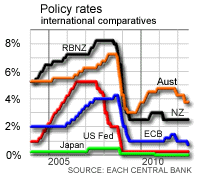 US Federal Reserve Chairman Ben Bernanke has warned the US economy remains "stressed" and in need of significant fiscal and monetary stimulus, including the prospect of "quantitative easing" or money printing because the Federal Funds Rate will soon approach zero. "Although conventional interest rate policy is constrained by the fact that nominal interest rates cannot fall below zero, the second arrow in the Federal Reserve's quiver--the provision of liquidity--remains effective," Bernanke said in this speech overnight. "Indeed, there are several means by which the Fed could influence financial conditions through the use of its balance sheet, beyond expanding our lending to financial institutions. First, the Fed could purchase longer-term Treasury or agency securities on the open market in substantial quantities. This approach might influence the yields on these securities, thus helping to spur aggregate demand," he said. "Second, the Federal Reserve can provide backstop liquidity not only to financial institutions but also directly to certain financial markets, as we have recently done for the commercial paper market. Such programs are promising because they sidestep banks and primary dealers to provide liquidity directly to borrowers or investors in key credit markets," he said.
US Federal Reserve Chairman Ben Bernanke has warned the US economy remains "stressed" and in need of significant fiscal and monetary stimulus, including the prospect of "quantitative easing" or money printing because the Federal Funds Rate will soon approach zero. "Although conventional interest rate policy is constrained by the fact that nominal interest rates cannot fall below zero, the second arrow in the Federal Reserve's quiver--the provision of liquidity--remains effective," Bernanke said in this speech overnight. "Indeed, there are several means by which the Fed could influence financial conditions through the use of its balance sheet, beyond expanding our lending to financial institutions. First, the Fed could purchase longer-term Treasury or agency securities on the open market in substantial quantities. This approach might influence the yields on these securities, thus helping to spur aggregate demand," he said. "Second, the Federal Reserve can provide backstop liquidity not only to financial institutions but also directly to certain financial markets, as we have recently done for the commercial paper market. Such programs are promising because they sidestep banks and primary dealers to provide liquidity directly to borrowers or investors in key credit markets," he said.
"In this spirit, the Federal Reserve and the Treasury jointly announced last week a facility that will lend against asset-backed securities collateralized by student loans, auto loans, credit card loans, and loans guaranteed by the Small Business Administration. The Federal Reserve's credit risk exposure in this facility will be minimized because the collateral will be subject to a "haircut" and because the Treasury is providing $20 billion of EESA (Emergency Economic Stabilisation Act) capital as supplementary loss protection. Each of these approaches has the potential to improve the functioning of financial markets and to stimulate the economy." "Finally, working together with the Treasury, the FDIC, and other agencies, we must take all steps necessary to minimize systemic risk. The capital injections into the banking system under the EESA, the FDIC's guarantee program, and the provision of liquidity by the Federal Reserve have already served to greatly reduce the risk that a systemically important financial institution will fail. We at the Federal Reserve and our colleagues at other federal agencies will carefully monitor the conditions of all key financial institutions and stand ready to act as needed to preserve their viability in this difficult financial environment." What are your views? How far could these three points given by Bernanke go in fixing the US economy? What policies do you think the Fed should be focussing on in trying to fix the economy?

We welcome your comments below. If you are not already registered, please register to comment
Remember we welcome robust, respectful and insightful debate. We don't welcome abusive or defamatory comments and will de-register those repeatedly making such comments. Our current comment policy is here.